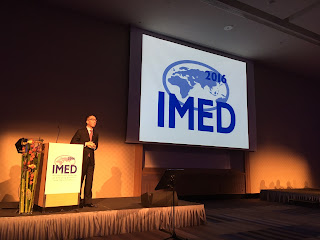It has been a packed two weeks with back to back
trips to New Orleans (ID Week 2016) and Vienna, Austria (IMED 2016). I am back
in the USA, back on the ID consult service and back at work.
Today I had the pleasure of hosting and resuscitating the Virginia
Commonwealth University-University of Virginia Fall/Spring Semester case
conference at the VCU Alumni House after about a 20+ year lapse. Along with my
esteemed colleague and collaborator, UVA ID Division Chair, Dr. Bill Petri, we
were able to pull it off.
A special thanks (always) to my assistants
Peggy Andrews and Krystle Shaw for taking care of the fine details.
The conference was very well attended. Two phenomenal cases were
presented, one by VCU fellow Dr. Salma Abbas (monomicrobial, pyogenic Klebsiella
pneumonia liver abscess) and one by UVA fellow Dr. Elizabeth Gulleen
(Corynebacterium diphtheriae pharyngitis with heart block).
This conference went off in the true spirit of academia, with a sharing of
cases, ideas and knowledge, all with thoughtful dialogue. That's what it is all about.
I am already looking forward to the spring semester event at UVA.
 |
| VCU Alumni House |
 |
| Event |
 |
| Left to Right: Peggy Andrews and Krystle Shaw of the VCU ID Team |
 |
| Case Conference |
 I spent the last week plowing through Sapiens, A Brief History of Humankind by Yuval Noah Harari.
I spent the last week plowing through Sapiens, A Brief History of Humankind by Yuval Noah Harari. 



































